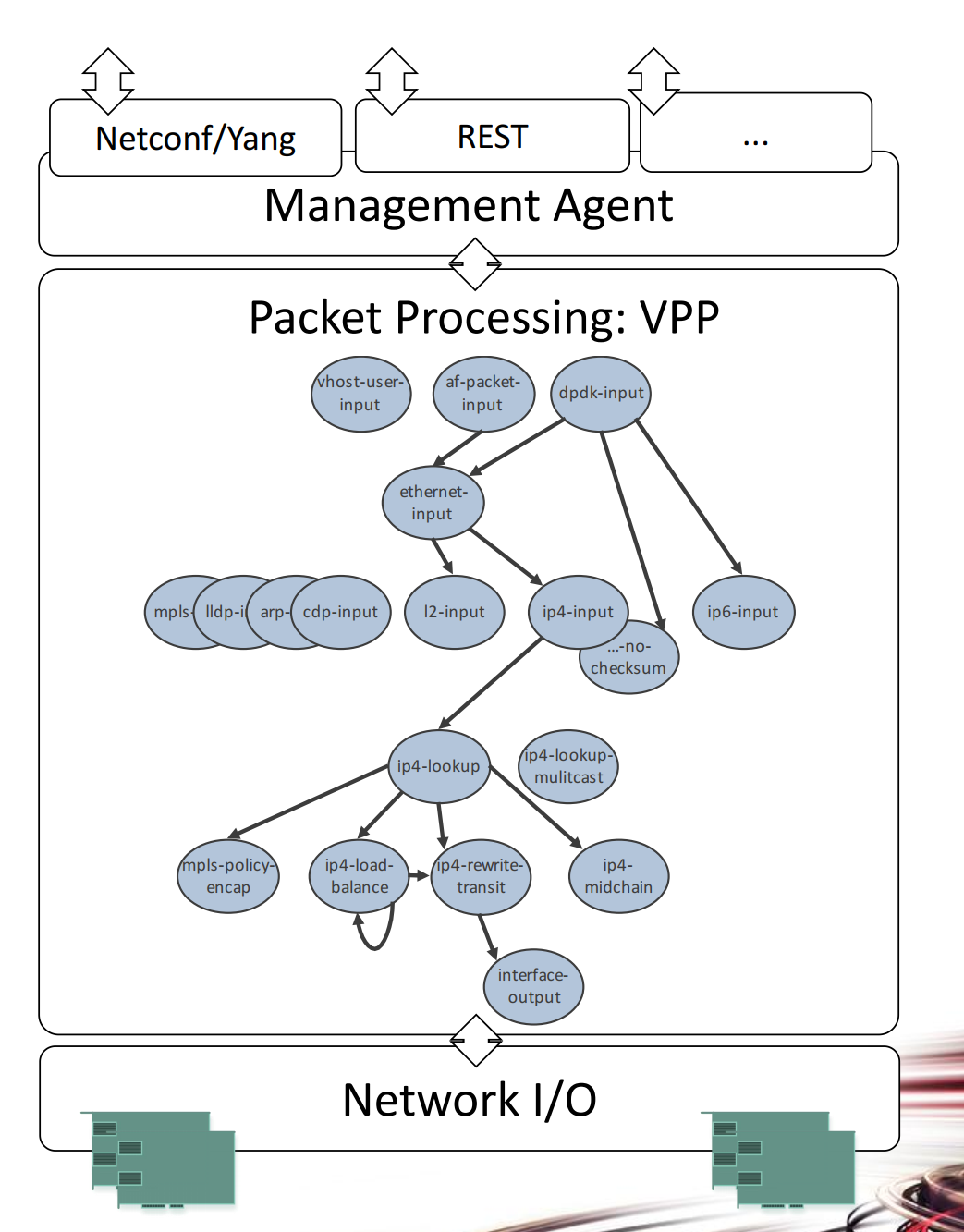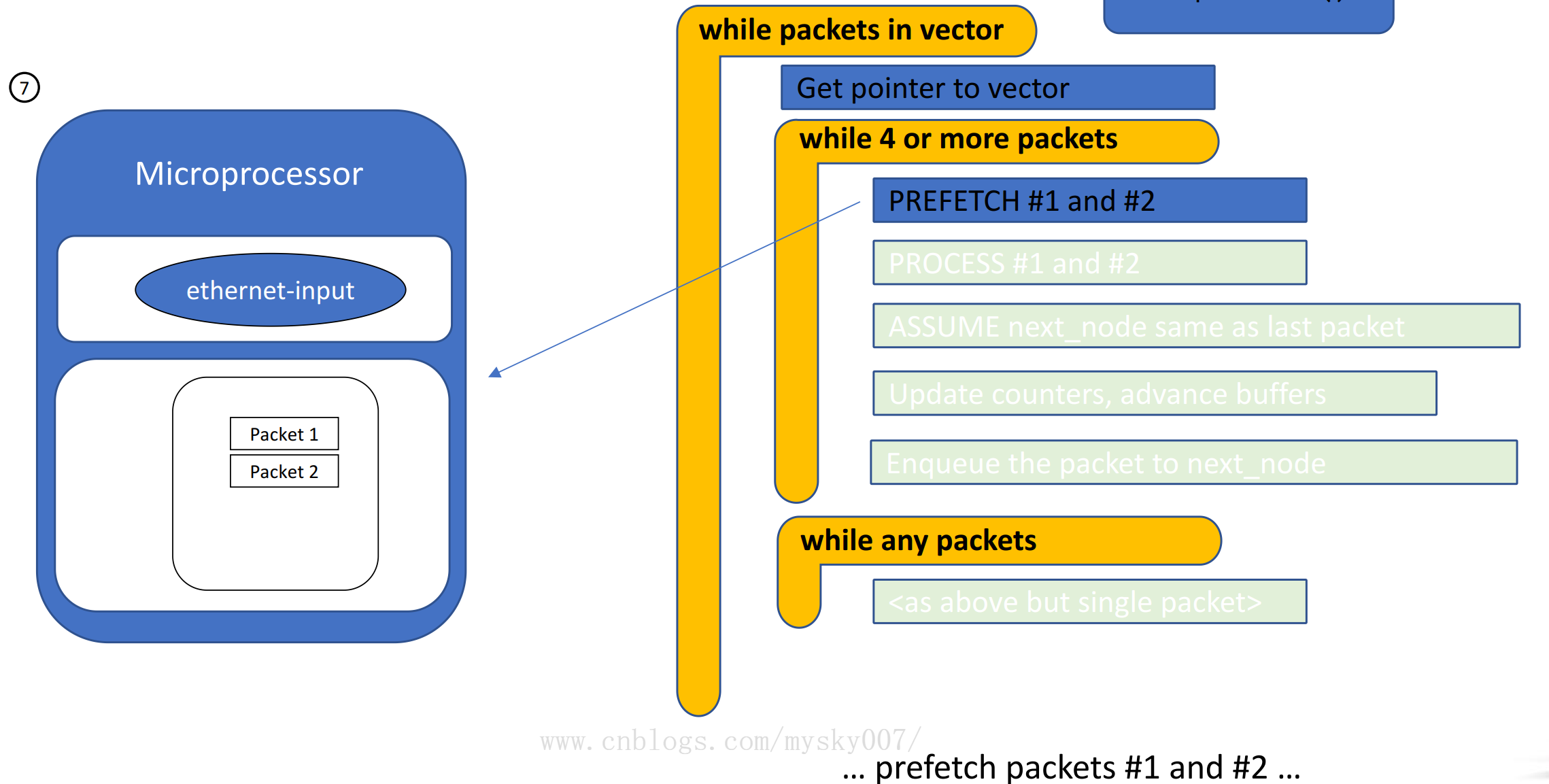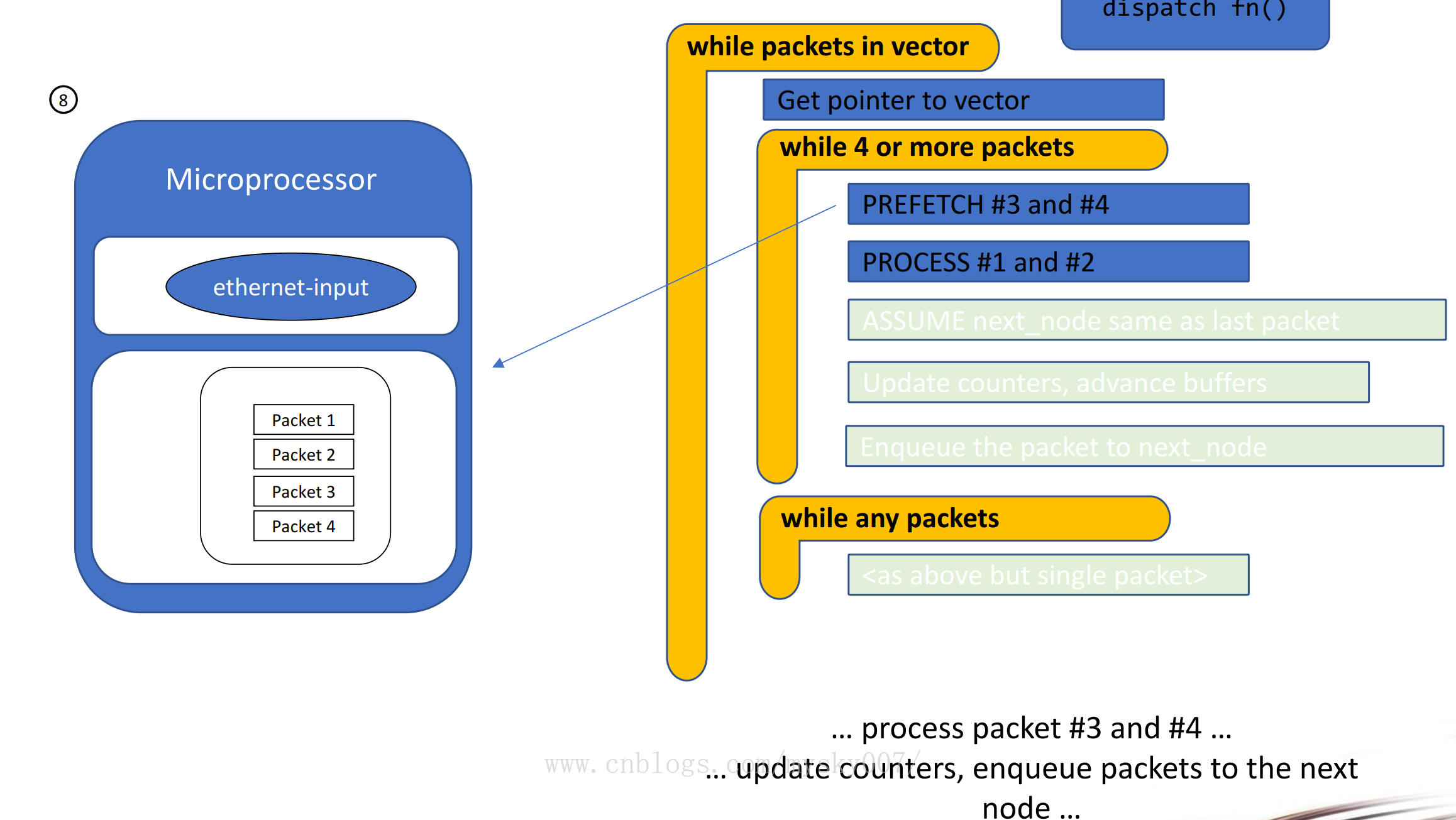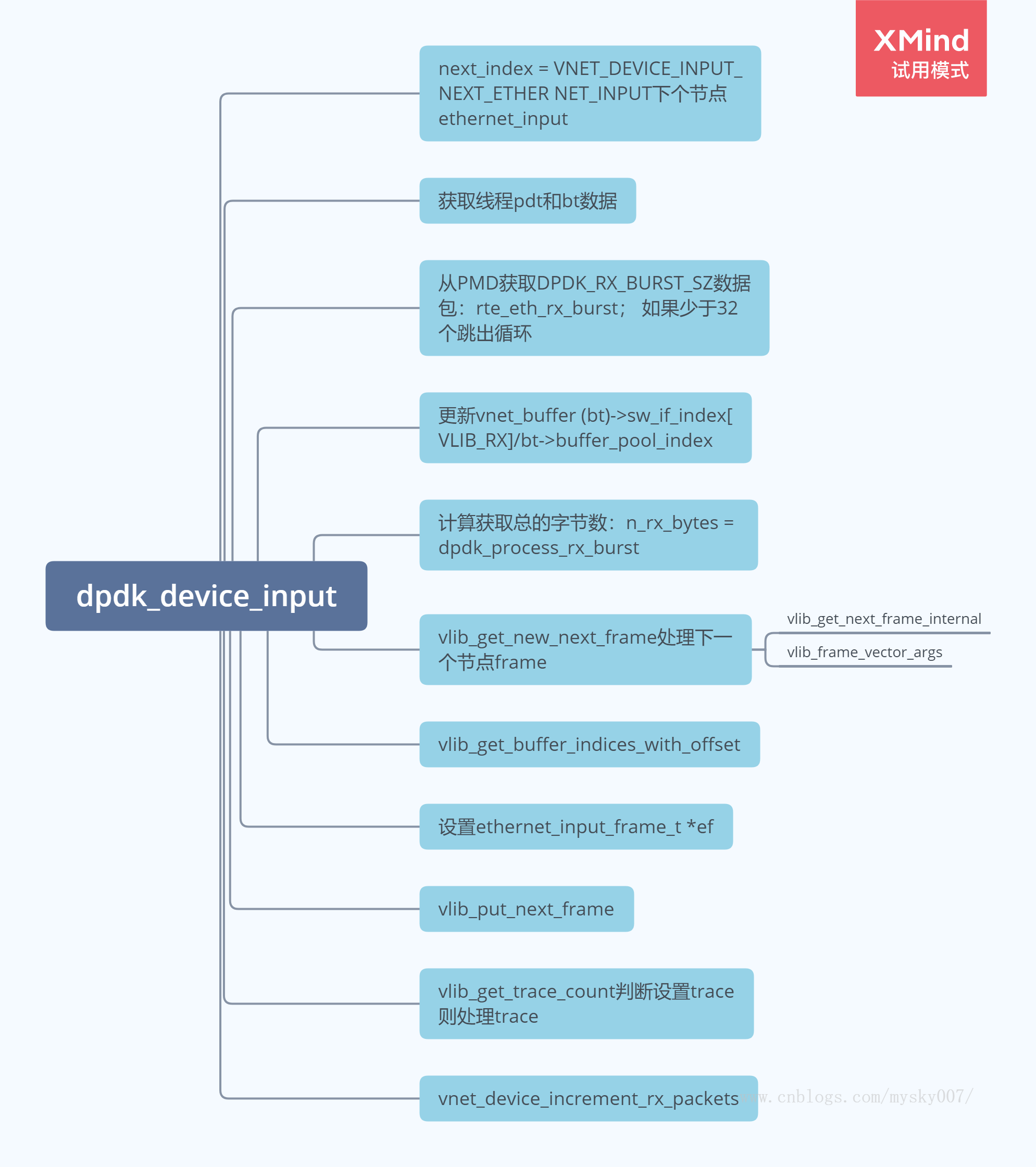节点类型作用:
VLIB_NODE_TYPE_INTERNAL
内部节点,最典型的节点接收缓冲向量,执行操作。vpp大部分节点是这个角色,主要对数据流做内部处理,比如ip4-input-no-checksum/ip4-icmp-input等内部功能节点
VLIB_NODE_TYPE_INPUT
输入节点,通常是设备输入节点。从零开始创建框架并分派到内部节点(internal), 比如dpdk-input/af-packet-input节点,
input节点收包模式分为轮询和中断两种模式vlib_node_state_t.
VLIB_NODE_TYPE_PRE_INPUT
目前只有一个epoll node,对socket相关逻辑提供服务,主要使用在控制业务上。
VLIB_NODE_TYPE_PROCESS
该类型的node可以被挂起也可以被恢复,有独立的分配在heap上的运行栈。类似与在一个线程中实现了多任务的调度机制,主要用来修改vpp node内部参数。
线程节点,和线程一样,可以可以暂停、等待事件、恢复,不同于pthread_thread,他是基于setjump/longjump实现的弦程.
等待一个事件:always_inline f64 vlib_process_wait_for_event_or_clock (vlib_main_t * vm, f64 dt)
发送一个事件: always_inline void vlib_process_signal_event (vlib_main_t * vm, uword node_index, uword type_opaque, uword data)
数据流节点中流程:

- 输入节点轮询(或中断驱动)接口的接收队列,获取批量报文。
- 接着把这些报文按照下个节点功能组成一个矢量(vector)或者一帧(frame)。
- 比如:输入节点收集所有IPv4的报文并把它们传递给ip4-input节点;
- 输入节点收集所有IPv6的报文并把它们传递给ip6-input节点。
- 当ip6-input节点被调度时,它取出这一帧报文,利用双循环(dual-loop) 或四循环(quad-loop)以及预取报文到CPU缓存技术处理报文,以达到最优性能。这能够通过减少缓存未命中数来有效利用CPU缓存。当ip6-input节点处理完当前帧的所有报文后,把报文传递到后续不同的节点。比如:如果某报文校验失败,就被传送到error-drop节点;正常报文被传送到ip6-lookup节点。
- 一帧报文依次通过不同的图形节点,直到它们被interface-output节点发送出去。
VPP图形节点的处理逻辑
第一步:

第二步:

第三步:

第四步:

按照网络功能一次处理一帧报文优势:
- 从软件工程的角度看,每一个图形节点是独立和自治的。
- 从性能的角度看,主要的好处是可以优化CPU指令缓存(i-cache)的使用。当前帧的第一个报文加载当前节点的指令到指令缓存,当前帧的后续报文就可以“免费”使用指令缓存。这里,VPP充分利用了CPU的超标量结构,使报文内存加载和报文处理交织进行,达到更有效地利用CPU处理流水线。
- VPP也充分利用了CPU的预测执行功能来达到更好的性能。从预测重用报文间的转发对象(比如邻接表和路由查找表),以及预先加载报文内容到CPU的本地数据缓存(d-cache)供下一次循环使用,这些有效使用计算硬件的技术,使得VPP可以利用更细粒度的并行性
VLIB_INIT_FUNCTION宏定义分析
举个例子:
1 static clib_error_t *
2 dpdk_init (vlib_main_t * vm)
3 {
4 dpdk_main_t *dm = &dpdk_main;
5 clib_error_t *error = 0;
6
7 /* verify that structs are cacheline aligned */
8 STATIC_ASSERT (offsetof (dpdk_device_t, cacheline0) == 0,
9 "Cache line marker must be 1st element in dpdk_device_t");
10 STATIC_ASSERT (offsetof (dpdk_device_t, cacheline1) ==
11 CLIB_CACHE_LINE_BYTES,
12 "Data in cache line 0 is bigger than cache line size");
13 STATIC_ASSERT (offsetof (frame_queue_trace_t, cacheline0) == 0,
14 "Cache line marker must be 1st element in frame_queue_trace_t");
15 STATIC_ASSERT (RTE_CACHE_LINE_SIZE == 1 << CLIB_LOG2_CACHE_LINE_BYTES,
16 "DPDK RTE CACHE LINE SIZE does not match with 1<<CLIB_LOG2_CACHE_LINE_BYTES");
17
18 dpdk_cli_reference ();
19
20 dm->vlib_main = vm;
21 dm->vnet_main = vnet_get_main ();
22 dm->conf = &dpdk_config_main;
23
24 dm->conf->nchannels = 4;
25 vec_add1 (dm->conf->eal_init_args, (u8 *) "vnet");
26 vec_add1 (dm->conf->eal_init_args, (u8 *) "--in-memory");
27
28 /* Default vlib_buffer_t flags, DISABLES tcp/udp checksumming... */
29 dm->buffer_flags_template = (VLIB_BUFFER_TOTAL_LENGTH_VALID |
30 VLIB_BUFFER_EXT_HDR_VALID |
31 VNET_BUFFER_F_L4_CHECKSUM_COMPUTED |
32 VNET_BUFFER_F_L4_CHECKSUM_CORRECT);
33
34 dm->stat_poll_interval = DPDK_STATS_POLL_INTERVAL;
35 dm->link_state_poll_interval = DPDK_LINK_POLL_INTERVAL;
36
37 dm->log_default = vlib_log_register_class ("dpdk", 0);
38
39 return error;
40 }
VLIB_INIT_FUNCTION (dpdk_init);
VLIB_INIT_FUNCTION 宏定义展开如下所示,主要由VLIB_DECLARE_INIT_FUNCTION宏定义完成注册动作:
1 #ifndef CLIB_MARCH_VARIANT
2 #define VLIB_DECLARE_INIT_FUNCTION(x, tag)
3 vlib_init_function_t * _VLIB_INIT_FUNCTION_SYMBOL (x, tag) = x;
4 static void __vlib_add_##tag##_function_##x (void)
5 __attribute__((__constructor__)) ;
6 static _vlib_init_function_list_elt_t _vlib_init_function_##tag_##x;
7 static void __vlib_add_##tag##_function_##x (void)
8 {
9 vlib_main_t * vm = vlib_get_main();
10 _vlib_init_function_##tag_##x.next_init_function
11 = vm->tag##_function_registrations;
12 vm->tag##_function_registrations = &_vlib_init_function_##tag_##x;
13 _vlib_init_function_##tag_##x.f = &x;
14 _vlib_init_function_##tag_##x.name = #x;
15 }
16 static void __vlib_rm_##tag##_function_##x (void)
17 __attribute__((__destructor__)) ;
18 static void __vlib_rm_##tag##_function_##x (void)
19 {
20 vlib_main_t * vm = vlib_get_main();
21 _vlib_init_function_list_elt_t *this, *prev;
22 this = vm->tag##_function_registrations;
23 if (this == 0)
24 return;
25 if (this->f == &x)
26 {
27 vm->tag##_function_registrations = this->next_init_function;
28 return;
29 }
30 prev = this;
31 this = this->next_init_function;
32 while (this)
33 {
34 if (this->f == &x)
35 {
36 prev->next_init_function =
37 this->next_init_function;
38 return;
39 }
40 prev = this;
41 this = this->next_init_function;
42 }
43 }
44 static _vlib_init_function_list_elt_t _vlib_init_function_##tag_##x
45 #else
46 /* create unused pointer to silence compiler warnings and get whole
47 function optimized out */
48 #define VLIB_DECLARE_INIT_FUNCTION(x, tag)
49 static __clib_unused void * __clib_unused_##tag##_##x = x
50 #endif
51
52 #define VLIB_INIT_FUNCTION(x) VLIB_DECLARE_INIT_FUNCTION(x,init)
VLIB_INIT_FUNCTION宏定义中的x表示注册的函数,传递给VLIB_DECLARE_INIT_FUNCTION宏定义并添加第二个参数init,
VLIB_DECLARE_INIT_FUNCTION宏定义主要由两个自动构造的函数组成,一个是注册函数、一个是卸载函数
首先构造初始化函数,_VLIB_INIT_FUNCTION_SYMBOL宏定义构造函数头:申明类型为:vlib_init_function_t *的变量
初始化注册流程
当vpp启动时根据以下路径对init_function_registrations链表中的注册函数进行调用完成初始化工作:
main-> vlib_unix_main -> clib_calljmp (thread0, (uword) vm,(void *) -> vlib_main -> vlib_call_all_init_functions (vm) -> vlib_call_init_exit_functions -> call_init_exit_functions_internal
1 static inline clib_error_t *
2 call_init_exit_functions_internal (vlib_main_t * vm,
3 _vlib_init_function_list_elt_t ** headp,
4 int call_once, int do_sort)
5 {
6 clib_error_t *error = 0;
7 _vlib_init_function_list_elt_t *i;
8
9 if (do_sort && (error = vlib_sort_init_exit_functions (headp)))
10 return (error);
11
12 i = *headp;
13 while (i)
14 {
15 if (call_once && !hash_get (vm->init_functions_called, i->f))
16 {
17 if (call_once)
18 hash_set1 (vm->init_functions_called, i->f);
19 error = i->f (vm);
20 if (error)
21 return error;
22 }
23 i = i->next_init_function;
24 }
25 return error;
26 }
dpdk_device_input
1 static_always_inline u32
2 dpdk_device_input (vlib_main_t * vm, dpdk_main_t * dm, dpdk_device_t * xd,
3 vlib_node_runtime_t * node, u32 thread_index, u16 queue_id)
4 {
5 uword n_rx_packets = 0, n_rx_bytes;
6 u32 n_left, n_trace;
7 u32 *buffers;
8 u32 next_index = VNET_DEVICE_INPUT_NEXT_ETHERNET_INPUT;
9 struct rte_mbuf **mb;
10 vlib_buffer_t *b0;
11 u16 *next;
12 u16 or_flags;
13 u32 n;
14 int single_next = 0;
15
16 dpdk_per_thread_data_t *ptd = vec_elt_at_index (dm->per_thread_data,
17 thread_index);
18 vlib_buffer_t *bt = &ptd->buffer_template;
19
20 if ((xd->flags & DPDK_DEVICE_FLAG_ADMIN_UP) == 0)
21 return 0;
22
23 /* get up to DPDK_RX_BURST_SZ buffers from PMD */
24 while (n_rx_packets < DPDK_RX_BURST_SZ)
25 {
26 n = rte_eth_rx_burst (xd->port_id, queue_id,
27 ptd->mbufs + n_rx_packets,
28 DPDK_RX_BURST_SZ - n_rx_packets);
29 n_rx_packets += n;
30
31 if (n < 32)
32 break;
33 }
34
35 if (n_rx_packets == 0)
36 return 0;
37
38 /* Update buffer template */
39 vnet_buffer (bt)->sw_if_index[VLIB_RX] = xd->sw_if_index;
40 bt->error = node->errors[DPDK_ERROR_NONE];
41 /* as DPDK is allocating empty buffers from mempool provided before interface
42 start for each queue, it is safe to store this in the template */
43 bt->buffer_pool_index = xd->buffer_pool_for_queue[queue_id];
44 bt->ref_count = 1;
45 vnet_buffer (bt)->feature_arc_index = 0;
46 bt->current_config_index = 0;
47
48 /* receive burst of packets from DPDK PMD */
49 if (PREDICT_FALSE (xd->per_interface_next_index != ~0))
50 next_index = xd->per_interface_next_index;
51
52 /* as all packets belong to the same interface feature arc lookup
53 can be don once and result stored in the buffer template */
54 if (PREDICT_FALSE (vnet_device_input_have_features (xd->sw_if_index)))
55 vnet_feature_start_device_input_x1 (xd->sw_if_index, &next_index, bt);
56
57 if (xd->flags & DPDK_DEVICE_FLAG_MAYBE_MULTISEG)
58 n_rx_bytes = dpdk_process_rx_burst (vm, ptd, n_rx_packets, 1, &or_flags);
59 else
60 n_rx_bytes = dpdk_process_rx_burst (vm, ptd, n_rx_packets, 0, &or_flags);
61
62 if (PREDICT_FALSE (or_flags & PKT_RX_FDIR))
63 {
64 /* some packets will need to go to different next nodes */
65 for (n = 0; n < n_rx_packets; n++)
66 ptd->next[n] = next_index;
67
68 /* flow offload - process if rx flow offload enabled and at least one
69 packet is marked */
70 if (PREDICT_FALSE ((xd->flags & DPDK_DEVICE_FLAG_RX_FLOW_OFFLOAD) &&
71 (or_flags & PKT_RX_FDIR)))
72 dpdk_process_flow_offload (xd, ptd, n_rx_packets);
73
74 /* enqueue buffers to the next node */
75 vlib_get_buffer_indices_with_offset (vm, (void **) ptd->mbufs,
76 ptd->buffers, n_rx_packets,
77 sizeof (struct rte_mbuf));
78
79 vlib_buffer_enqueue_to_next (vm, node, ptd->buffers, ptd->next,
80 n_rx_packets);
81 }
82 else
83 {
84 u32 *to_next, n_left_to_next;
85
86 vlib_get_new_next_frame (vm, node, next_index, to_next, n_left_to_next);
87 vlib_get_buffer_indices_with_offset (vm, (void **) ptd->mbufs, to_next,
88 n_rx_packets,
89 sizeof (struct rte_mbuf));
90
91 if (PREDICT_TRUE (next_index == VNET_DEVICE_INPUT_NEXT_ETHERNET_INPUT))
92 {
93 vlib_next_frame_t *nf;
94 vlib_frame_t *f;
95 ethernet_input_frame_t *ef;
96 nf = vlib_node_runtime_get_next_frame (vm, node, next_index);
97 f = vlib_get_frame (vm, nf->frame);
98 f->flags = ETH_INPUT_FRAME_F_SINGLE_SW_IF_IDX;
99
100 ef = vlib_frame_scalar_args (f);
101 ef->sw_if_index = xd->sw_if_index;
102 ef->hw_if_index = xd->hw_if_index;
103
104 /* if PMD supports ip4 checksum check and there are no packets
105 marked as ip4 checksum bad we can notify ethernet input so it
106 can send pacets to ip4-input-no-checksum node */
107 if (xd->flags & DPDK_DEVICE_FLAG_RX_IP4_CKSUM &&
108 (or_flags & PKT_RX_IP_CKSUM_BAD) == 0)
109 f->flags |= ETH_INPUT_FRAME_F_IP4_CKSUM_OK;
110 vlib_frame_no_append (f);
111 }
112 n_left_to_next -= n_rx_packets;
113 vlib_put_next_frame (vm, node, next_index, n_left_to_next);
114 single_next = 1;
115 }
116
117 /* packet trace if enabled */
118 if (PREDICT_FALSE ((n_trace = vlib_get_trace_count (vm, node))))
119 {
120 if (single_next)
121 vlib_get_buffer_indices_with_offset (vm, (void **) ptd->mbufs,
122 ptd->buffers, n_rx_packets,
123 sizeof (struct rte_mbuf));
124
125 n_left = n_rx_packets;
126 buffers = ptd->buffers;
127 mb = ptd->mbufs;
128 next = ptd->next;
129
130 while (n_trace && n_left)
131 {
132 b0 = vlib_get_buffer (vm, buffers[0]);
133 if (single_next == 0)
134 next_index = next[0];
135 vlib_trace_buffer (vm, node, next_index, b0, /* follow_chain */ 0);
136
137 dpdk_rx_trace_t *t0 = vlib_add_trace (vm, node, b0, sizeof t0[0]);
138 t0->queue_index = queue_id;
139 t0->device_index = xd->device_index;
140 t0->buffer_index = vlib_get_buffer_index (vm, b0);
141
142 clib_memcpy_fast (&t0->mb, mb[0], sizeof t0->mb);
143 clib_memcpy_fast (&t0->buffer, b0,
144 sizeof b0[0] - sizeof b0->pre_data);
145 clib_memcpy_fast (t0->buffer.pre_data, b0->data,
146 sizeof t0->buffer.pre_data);
147 clib_memcpy_fast (&t0->data, mb[0]->buf_addr + mb[0]->data_off,
148 sizeof t0->data);
149 n_trace--;
150 n_left--;
151 buffers++;
152 mb++;
153 next++;
154 }
155 vlib_set_trace_count (vm, node, n_trace);
156 }
157
158 vlib_increment_combined_counter
159 (vnet_get_main ()->interface_main.combined_sw_if_counters
160 + VNET_INTERFACE_COUNTER_RX, thread_index, xd->sw_if_index,
161 n_rx_packets, n_rx_bytes);
162
163 vnet_device_increment_rx_packets (thread_index, n_rx_packets);
164
165 return n_rx_packets;
166 }
